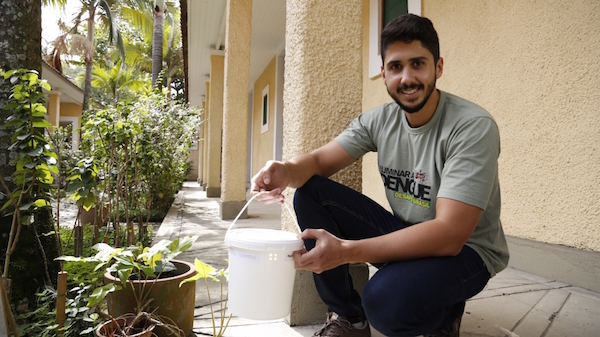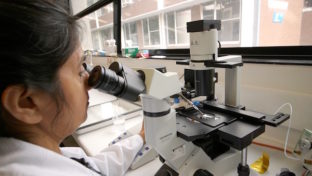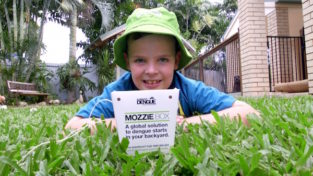- by Alison
Learn how Wolbachia bacteria are reducing the impact of dengue
Wolbachia bacteria are helping the Eliminate Dengue Program fight the disease: reducing the virus’ ability to replicate and the mosquitoes’ ability to transmit it. This unique approach is both cost-effective and self-sustaining; with community buy-in and participation critical to its long-term success.
The Eliminate Dengue Program has developed a totally natural approach to fighting dengue: it halts transmission of the dengue virus by using Wolbachia bacteria to stop the virus from replicating within Aedes aegypti mosquitoes.
How does the Eliminate Dengue approach work?
The dengue transmission cycle is quite simple:
1. A healthy mosquito contracts the virus by biting an infected person.
2. The virus matures (replicates) inside the mosquito over a short incubation period.
3. At the end of this period, anyone bitten by the infected mosquito contracts dengue.
4. The virus matures (replicates) inside the person over a short incubation period.
5. A healthy mosquito contracts the virus by biting an infected person.
However, when a mosquito with Wolbachia bites a person infected with dengue, the virus inside it does not thrive. It must fight the Wolbachia bacteria for the resources it needs to mature – with the bacteria inevitably coming out on top.
“The mosquitoes with Wolbachia can still catch dengue,” explains Shane Fairlie, Global Communications and Engagement Manager for the Eliminate Dengue Program. “But they can’t pass it onto humans.”

Image courtesy of Eliminate Dengue
In the early days, microscopic injection techniques were used first to transfer Wolbachia bacteria from fruit fly into Aedes aegypti mosquitoes. Today, Eliminate Dengue researchers rear colonies of mosquitoes with Wolbachia in the lab. The bacteria are naturally passed down from one mosquito generation to the next.
When researchers release a small number of Wolbachia bacteria-infected mosquitoes into a local community, they breed with the wild mosquitoes, passing on the bacteria. After between two and three months, the majority of the mosquitoes in that community have the Wolbachia and the Eliminate Dengue team stops releasing. The local community continues to host strategically-placed mosquito traps. Since the method is self-sustaining, there’s never any need for further Wolbachia mosquitoes to be released, making the approach cost effective.
The research team returns every few weeks or few months to check the traps. “After we leave the area, our only task is to periodically check traps to ensure the Wolbachia levels in the mosquito population are still high,” says Fairlie. “Volunteers in the local community look after the traps, so there’s no real on-going cost”
Wolbachia bacteria: grounded in research
The not-for-profit international collaboration behind the program is led by Melbourne’s Monash University. Led by Professor Scott O’Neill, Director of the university’s Institute of Vector-Borne Disease, Eliminate Dengue’s approach is based on years of laboratory research and extensive small-scale field trials.
Professor O’Neill has been working with Wolbachia for more than 20 years. His early research involved engineering Wolbachia to carry genes that reduce the mosquitoes’ ability to transmit viruses into a mosquito population.

Image courtesy of Eliminate Dengue
After trying a number of different approaches, some unique traits came to light. “While putting Wolbachia into the mosquitoes, we discovered the bacteria’s ability to block transmission of the dengue virus,” states Professor O’Neill. The bacteria no longer needed to be genetically engineered; putting the Wolbachia into the mosquitoes was enough to greatly reduce the viruses’ ability to replicate.
Funding from a Bill and Melinda Gates Foundation initiative gave the research a welcome boost in 2005. A further six years of research allowed the team to refine their approach and gain support from local governments and communities.
Open field trials began in 2011 and have now been conducted in Australia, Colombia, Vietnam, Brazil and Indonesia. These projects have shown this is a feasible approach to fighting dengue. “Mathematical models and our observational data show sufficient reduction to have a very large impact on transmission,” says Professor O’Neill.
Communities at its core
Local community engagement is a key of the program’s success: each project puts a significant amount of resource into gaining buy-in from the local community before releasing the mosquitoes with Wolbachia; and also into encouraging the community’s participation that is critical to sustaining each project.
“You can have a great approach that works in the lab from a technical perspective, but without it being effective in the field and community acceptance, it’s going to struggle to be sustainable,” adds Fairlie. In fact, the approach depends on communities taking the lead once the release phase is complete. Local volunteers are more than happy to host mosquito traps at their home
Eliminate Dengue uses local community engagement experts to help build community support in the months – even years – leading up to their field trials: sharing information, answering questions and listening to community concerns. Community members are invited to see how mosquitoes with Wolbachia are reared in the Eliminate Dengue laboratory. School children learn about different types of mosquito breeding sites.

Image courtesy of Eliminate Dengue
Toni Salgado, a volunteer in Rio de Janeiro, Brazil, shares his experience: “There was some hesitation in the beginning, in 2012, when the scientists first came here. But then we had meetings in which they explained to the community why this release was needed and residents agreed to participate. I am now proud to be part of it.”
The program also puts a great deal of time and effort into encouraging community participation. Local residents – including school children – grow and release their own Wolbachia mosquitoes as part of the project. “It is quite a good feeling knowing that just a minute of my time each fortnight is enough to benefit my neighborhood, and, potentially, others around the world. Even the busiest person could do this, and, in fact, we don’t have time not to because dengue outbreaks can be a huge burden on our community,” Doreen Ross, volunteer in Townsville, Australia.
Looking ahead in 2017
2017 is going to be a very important year for the Eliminate Dengue Program: significant new funding received last October means it can scale up its field trials this year. “We’re about to embark on a large-scale trial in the Columbian state of Antioquia, covering an area with more than 2 million residents over the next two years,” says Fairlie.
Other large-scale deployments on the horizon include an expansion into parts of Rio de Janeiro and Niteroi in Brazil that will reach a population of more than 2.5 million people over the next two years. In Indonesia, a large-scale efficacy study over the next two to three years across the city of Yogyakarta will rigorously evaluate the impact of Wolbachia bacteria on the transmission of dengue and other mosquito-borne diseases.
The program is also working to further reduce the cost of their approach, as Professor O’Neill explains: “Resources are limited in many countries suffering from dengue. We want to reduce the cost of deployment to less than a dollar per person.”
The team expects the approach will have a very significant impact in the long term. They see it as a complementary tool, supporting other initiatives in an Integrated Vector Management approach to fighting vector-borne diseases. “The Wolbachia mosquitoes should enhance the effectiveness of the dengue vaccine and the vaccine should enhance the effectiveness of the Wolbachia mosquitoes,” concludes Professor O’Neill.
Tell us about any initiatives your community is involved in in the fight against dengue.

